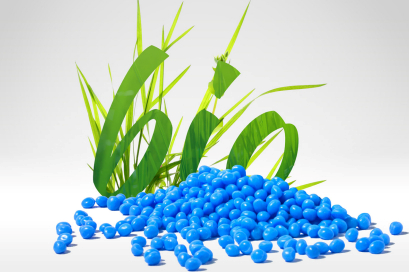PIR/PCR Recycled Content and Biobased TPEs for Broad Range of Applications
NPE2024: Kraiburg TPE launching PCR/PIR content polyolefin-based TPEs and its expanded line of Thermolast R biobased TPEs.

Kraiburg TPE is launching a line of TPE compounds incorporating postindustrial and/or postconsumer recycled materials (PIR, PCR), and a new line of biobased TPE compounds, tailored for consumer goods, industrial and automotive applications. The recycled content and biobased materials include:
- RC/UV/AM series compounds are designed for automotive exterior applications with adhesion to PP and feature a PIR content of 30-50%. They are suitable for UV-resistance applications and are available in black as well as various hardness options ranging from 65 to 90 Shore A.
- RC/FG/AM series compounds are designed for automotive interior applications with adhesion to PP. They offer PIR content of up to 40%, depending on the desired hardness, meet the requirements of OEMs and their suppliers while supporting carbon footprint reduction and fulfilling emissions, fogging and odor requirements. They are available in different hardness options ranging from 65 to 85 Shore A.
- RC/PCR/AM series compounds are available with PCR content of up to 44% and for applications in the consumer and industrial market, offering multiple usage possibilities for applications requiring adhesion to PP. They come in a wide range of potential hardness options, from 40 to 90 Shore A, and are available in gray, with the possibility to be colored in several ways.
- The Thermolast R range includes a new line of products derived from renewable raw materials. These biobased TPEs can reduce carbon footprint by up to 50% compared to conventional nonrenewable alternatives. Kraiburg TPE is focusing on biobased TPEs sourced from non-food raw materials, including use of agricultural byproducts or nonedible waste from food production, thereby avoiding competition with food supply. The series includes compounds with adhesion to PP, ABS/PC and nylon within a hardness range between 30 and 85 Shore A. Individual compounds have a bio-content of more than 60%. The materials have undergone rigorous evaluation in both injection molding and extrusion processes, showing processing properties comparable to those of fossil based TPEs.
Related Content
-
Prism Launches Car Mats Molded from Recycled Tires
Lines of mats are made of proprietary TPE formulated with 50% tire reclaim.
-
Bio-based Elastomer for Biopharmacuetical Tubing
Avient introduced its Versaflex elastomer formulated with bio-derived content.
-
Expanded Line of ‘Super’ Soft TPEs for Medical Devices
Kraiburg TPE has expanded its Thermolast M series of TPE compounds by additional hardness degrees.




